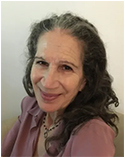

Sue Cristol, LMFT
Connections! Chapter News
Mishka Clavijo Kimball
President's Message
Read
Madeline Taylor
January Membership
Meeting Write-Up
Read
January Board Minutes
Read
Member Columnists
Charlyne Gelt
Cinema Therapy
Penguin Bloom
Read
Contributors
Sue Cristol
What We Need to Know
About Conspiracy Theories
Read
Lynne Azpeitia
Getting Paid
Read
Scholarship
Stefanie Gabler
Read
Sponsors
Insight Treatment
Programs
Read
eBlasts
February 2021 eBlasts
Read
March 2021 eBlasts
Read
Contact Us
Read
Resources
Professional Resources
Read
Community Resources
Read
Member Contributor — Sue Cristol, LMFT
What We Need to Know About Conspiracy Theories
And the People Who Believe Them
I would like to begin by defining what a conspiracy theory is. A conspiracy theory explains important events such as secret plots by powerful groups wishing to do harm. It is a theory that alleges a secret of great importance is being hidden from the general public. Recent estimates indicate that a large percentage of Americans believe in one or many conspiracy theories.
Current research regarding conspiracy theories helps to give us more insight into persons who accept their legitimacy. There appear to be certain factors relating to personality features and cognitive patterns. Some characteristics of these individuals are, but are not limited to, being suspicious, mistrusting, having a need to feel special, seeing the world in general as a dangerous place. Additionally, traumatic childhood experiences may play a part as well. Also, there is a tendency to perceive patterns and connect them to unrelated events. Other factors borne out by the research are unmet psychological needs, e.g., how the conspiracy theory somehow satisfies the need for assurance and safety.
The notion that somehow, we have control over world events can be comforting in these chaotic times. It may account for the rise in conspiracy theories over the last few years. As therapists, it is important to understand these beliefs and how they relate to anxiety disorders, depression as well as other more severe conditions such as schizophrenia. If we look at schizophrenia on a continuum, schizotypal personality disorder would share some of the traits of schizophrenia without the acute and disabling psychotic symptoms. The research on conspiracy theories discusses the “schizotypy” constellation of personality characteristics.
Here are some “schizotypy” characteristics:
- Feelings that external events have an unusual personal meaning
- Unusual thinking, beliefs, perceptions, or behavior (the word “unusual” is problematic, unusual according to who exactly?)
- Odd speech
- Suspicious or paranoid ideas
- Bland emotional responses
- Lack of close friends
- Excessive, persistent social anxiety
The research has posited that these believers display many or all the above-mentioned traits. When we consider this list, it becomes obvious that we therapists treat clients with at least a couple or even a few of these features often, without ever having treated a person with a diagnosis of schizophrenia.
For many of our clients, gently challenging irrational beliefs and encouraging reality testing are a major part of treatment. Our awareness and understanding can help to identify an issue that may very well remain hidden from us such as childhood abuse, domestic violence or suicidality. Uncovering a client’s belief in a conspiracy theory can be tricky. It may a long-held belief that has become important for feeling safe and in control. It will require gentle prodding and not a direct challenge. With so many Americans holding these beliefs, we have our work cut out for us.
Counteracting exposure to dangerous conspiracy theories, such as the ones related to the Covid-19 vaccine, with practical information backed up by scientific research could be a beneficial part of “reality testing.” Others that involve government control may pose a more difficult task.
Now more than ever, mental health professionals need to stay informed, available and healthy. We are experiencing the pandemic along with our clients, so self-care is vital to enable us to be 100%. I wish all of you a healthy and productive 2021.
Susan Cristol, LMFT, is a licensed marriage and family therapist. She works with children, adolescents, couples or adults. Susan stays current on research in the field of special education, as well as research and the many writings in the areas of
psychology, sociology and marriage and family therapy. Her specialized training includes (but not limited to) cognitive behavioral therapy, trauma and abuse, domestic violence and play therapy. She may be reached 818.426.5546 or at https://susancristol.com/contact.